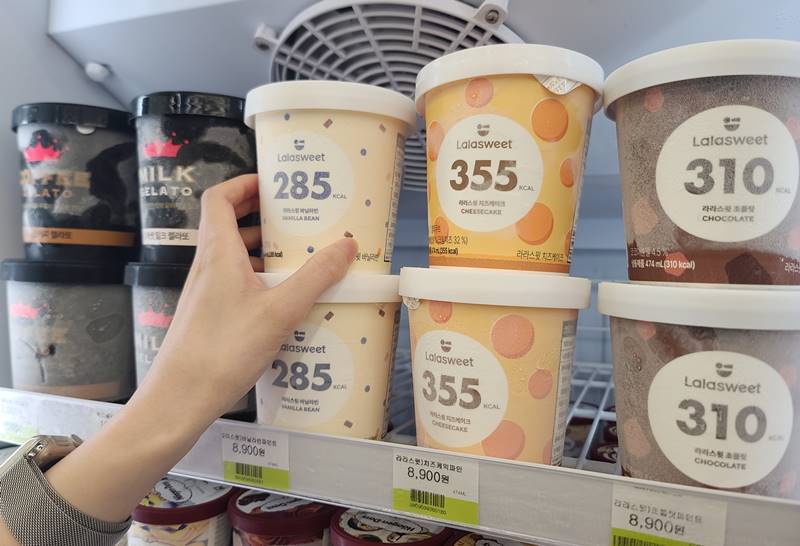 |
A customer picks up low-calorie ice cream sold at a CU convenience store in Seoul. (CU) |
With the fast-growing appetite for low-calorie and healthy food sparked by the coronavirus pandemic, South Korean retailers have seen a spike in their “low-food” products.
Low-food refers to low-calorie, gluten-free or non-alcohol food and beverage with fewer artificial additives.
E-commerce platform WeMakePrice said on Tuesday that its zero-calorie soft drink sales surged 396 percent as of June.
Sales of caffeine-free drinks increased by 96 percent. Among them, barley coffee, a roasted grain beverage made from ground barley with zero caffeine, showed almost a sixfold increase, while sales of kombucha, a fermented tea often made with green or black tea, jumped 221 percent in the cited period.
Non-alcoholic beers have seen more than an 18-fold increase in sales. “Unlike pre-COVID-19, when many had enjoyed heavy drinking with friends and colleagues, the burgeoning trend of honsul (drinking alone at home) and healthier lifestyle nowadays have driven consumers to drink lighter liquor,” a WeMakePrice official said.
Sales of gluten-free rice, pasta, bread, chocolate and other food products surged 38-fold. In the snacks category, sales of low-calorie chips and cookies grew more than 635 percent compared to 2021.
Unsalted butter and non-fat milk have seen 30 and 114 percent sales growth, respectively. Sales of low-sugar yogurts rose by 78 percent.
Local convenience store chain CU also said its low-calorie ice cream brand Lalasweet has logged a 120.7 percent increase in sales as of July, compared to a month earlier. Its June sales saw a 72.4 percent growth as well.
The ice cream has 75kcal per 100ml, about one-third the calories of the average 100ml of ice cream, and contains 20 percent less sugar.
Online sales of Skinnypig, another ice cream serving under 330kcal, rose sixfold in June, compared to May. Over 70 percent of consumers purchased more than four pints per order.
CU’s zero-calorie soft drink sales jumped 86.4 percent in the second quarter compared to the previous quarter.
“Coupled with the demand for a lifestyle that values health and wellness, consumers seek healthy pleasure, eating delicious food in small servings,” said a CU official.
By Byun Hye-jin (
hyejin2@heraldcorp.com)







![[Today’s K-pop] Blackpink’s Jennie, Lisa invited to Coachella as solo acts](http://res.heraldm.com/phpwas/restmb_idxmake.php?idx=644&simg=/content/image/2024/11/21/20241121050099_0.jpg)
